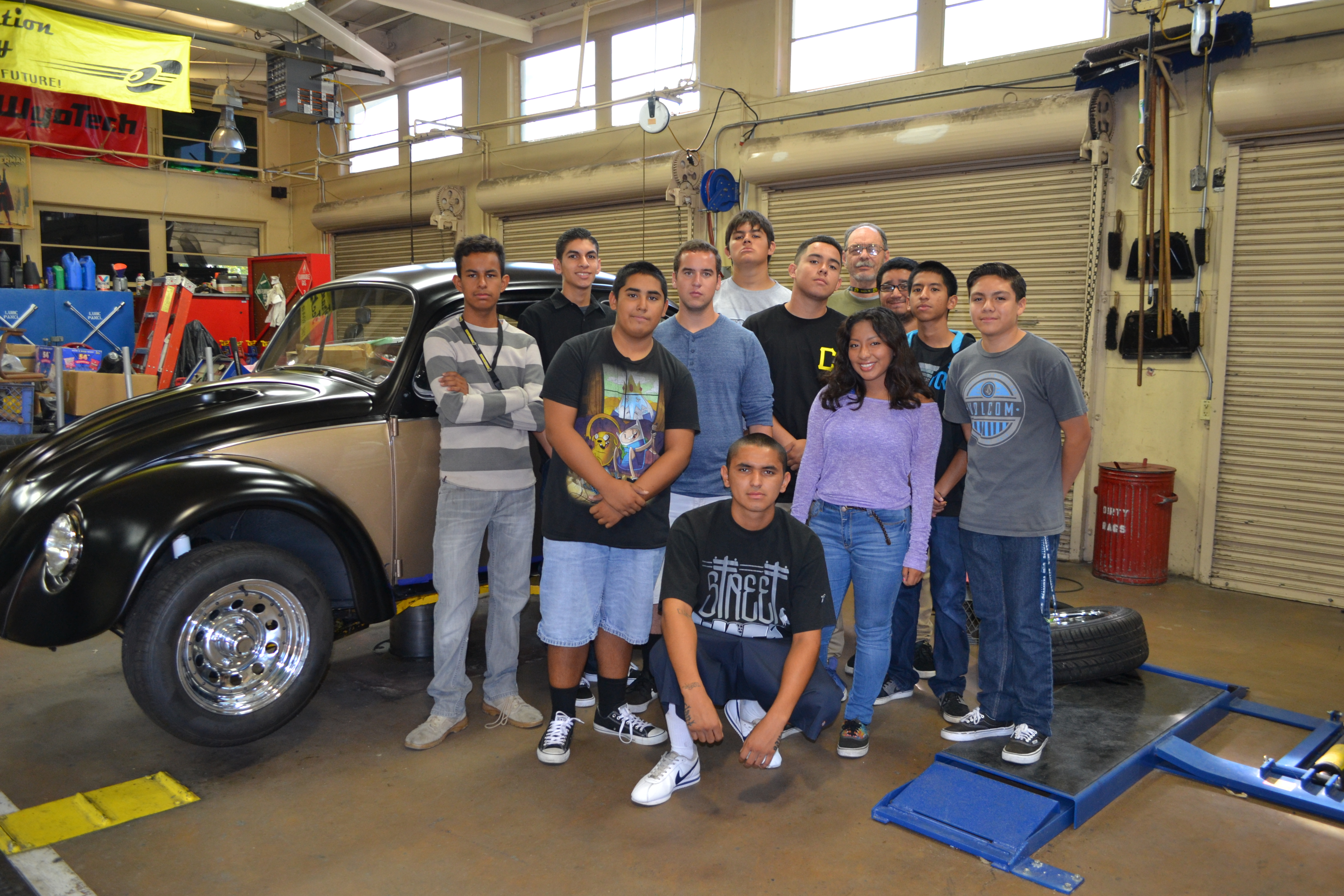Whittier Union High School District
Whittier Union Students to Debut Plug-in Electric 1969 VW Beetle
WHITTIER – The Automotive Engineering class at Santa Fe High School this month will unveil a revolutionary project that has been three years in the making: a newly converted electric 1969 Volkswagen Beetle capable of traveling 80 miles on one charge.
Since 2012, various student teams have collaborated and problem-solved to complete the painstaking project, overhauling the structure, refurbishing the body, coating it with black and gold paint, installing windows and seating and adding 800 pounds worth of electric batteries to the vehicle.
The project – which was made possible through material and monetary donations from the Santa Fe Springs Rotary Club – will make its debut at the club’s 8th Annual Classic Car Show on Sunday, Oct. 18.
“We’ve made dynamic progress and are miles ahead of where we were even last week,” said automotive teacher Bill Braicov, who will drive the vehicle from the school to Santa Fe Springs City Hall, where the car show will be held. “After hundreds of hours of work going into this vehicle, our students and the Santa Fe High community are excited to show how far this vehicle has come.”
At the inception of the Automotive Engineering course, Rotary President Dennis Turner and longtime member Sam Smith presented the school with a $3,000 donation for the project and pledged to ensure students attained all materials needed to complete the conversion.
Santa Fe Springs-based Ecology Auto Wrecking donated the vehicle to the class, while local businesses and Rotary members also contributed to the Beetle’s restoration and conversion, expected to cost about $10,000. The school’s Chiefs Auto Club has also held fundraisers.
“There has been a tremendous amount of support and effort on behalf of the community to get this project off the ground for the benefit of our students, who have been exploring the advantages of electric transportation and how it can assist them in their future careers,” Braicov said.
The Automotive Engineering class is a career technical education course that also meets the “G” college preparatory elective requirement for admission to the University of California and California State University systems. It is also articulated with Rio Hondo College, allowing students to earn college credit.
The technology-based program – which lays the foundation for success in college and career – is designed to give students a thorough introduction to the principles of engineering, aerodynamics and applied technology – specifically physics as it relates to the automobile. The curriculum is centered on many hands-on, inquiry-based, engineering design challenges, such as converting the VW into an electric car.
“Career technical education is extraordinarily important to providing our students options, as well as equipping them with the skills, talents and training that they can expand on in college or careers,” Principal Kevin Jamero said. “Students are gaining valuable first-hand tool experience and knowledge about this growing field and we’re proud to offer the program.”
The car conversion has become the capstone project of the program. Over the course of the class, students have stripped the vehicle of all of its internal combustion components and replaced them with an electric motor, batteries and an on-board computer.
Students have learned from professional technicians how to engineer new parts, retrofit, weld, install roof panels, fabric, brakes and tail lights, as well as include an emergency stop switch by the driver’s seat and a charger accessible through the vehicle’s fuel door.
“These Automotive Engineering students have been instrumental to making this a viable work of art,” Braicov said. “Without the students, it’s just a shell.”
The car show will take place from 9 a.m. to 3 p.m. on Oct. 18 at Santa Fe Springs City hall, 11760 Telegraph Road.
PHOTO CAPTION:
SANTAFEEV: The Automotive Engineering class at Santa Fe High School, led by teacher Bill Braicov, on Oct. 18 will debut a project that has been three years in the making: a newly converted electric 1969 Volkswagen Beetle capable of traveling 80 miles on one charge.

Whittier Union Students to Debut Plug-in Electric 1969 VW Beetle
Whittier Union High School District
- Image Title
- SANTAFEEV
- Image Caption
- SANTAFEEV: The Automotive Engineering class at Santa Fe High School, led by teacher Bill Braicov, on Oct. 18 will debut a project that has been three years in the making: a newly converted electric 1969 Volkswagen Beetle capable of traveling 80 miles on one charge.
Right-click on the image to save
